Picture this: your sales team hitting targets effortlessly, your customers feeling like VIPs, and your business running like clockwork. That’s the magic of CRM software in action.
CRM tools help you manage a company’s valuable clients from the very first interaction to closing the deal and maintaining a long-term relationship with the customer. They lead to increased lead conversions, customer retention, and improved agent productivity.
To help you choose the right solution, I’ve tested and listed the 20 best CRM systems used by top companies.
- 1. monday CRM – Best for Small to Medium Businesses
- 2. Zoho CRM – Best to Integrate with Zoho Suite
- 3. Pipedrive CRM – Best CRM for Lead Management
- 4. Freshsales CRM – Best to Integrate With Freshworks Products
- 5. HubSpot CRM – Best for Sales Funnels
- 6. Zendesk Sell – Best for Helpdesk Integrations
- 7. Salesforce CRM – Best Overall
- 8. Creatio CRM – Best for Customer Journey Automation
- 9. Apptivo CRM – Best CRM for Travel and Real Estate Industry
- 10. SugarCRM – Best for Marketing and Sales Automation
- 11. Insightly – Best for Remote Teams
- 12. Agile CRM – Good FREE Plan
- 13. Less Annoying CRM – Best CRM for Startups
- 14. Bitrix24 – AI Assistance Included
- 15. NetSuite CRM – Best for Enterprise
- 16. Bonsai CRM – Best CRM for Small Business
- 17. Keap – Best for E-commerce Businesses
- 18. Salesmate – Best for Campaign Automation
- 19. Engagebay – Best for Contacts Management
- 20. Nutshell – Easy to Use Interface
- Show less
You can trust Geekflare
At Geekflare, trust and transparency are paramount. Our team of experts, with over 185 years of combined experience in business and technology, tests and reviews software, ensuring our ratings and awards are unbiased and reliable. Learn how we test.
CRM Software Comparison Table
Below is a comparison chart of features of the top CRM tools. We have compared these parameters – mobile app availability, automation capabilities, and integration with 3rd party apps. These features will be discussed in detail later in this article.
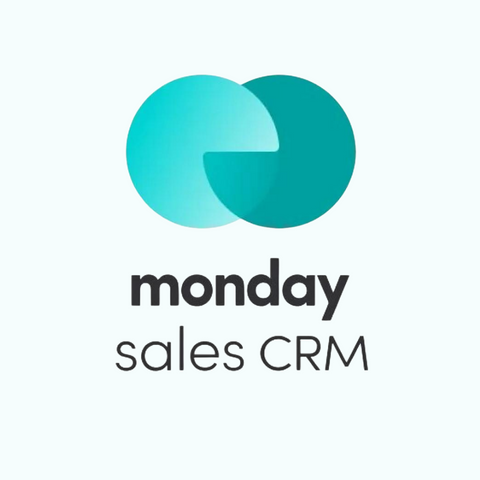 | 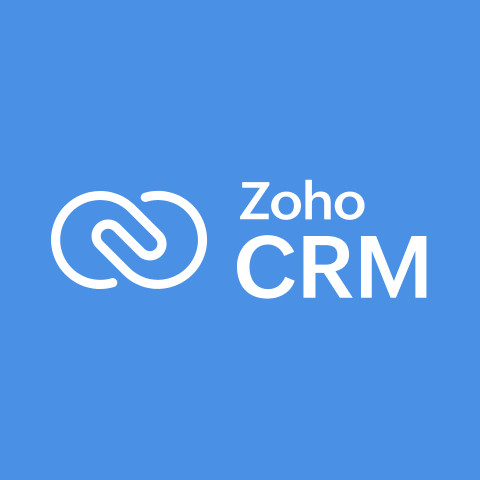 | 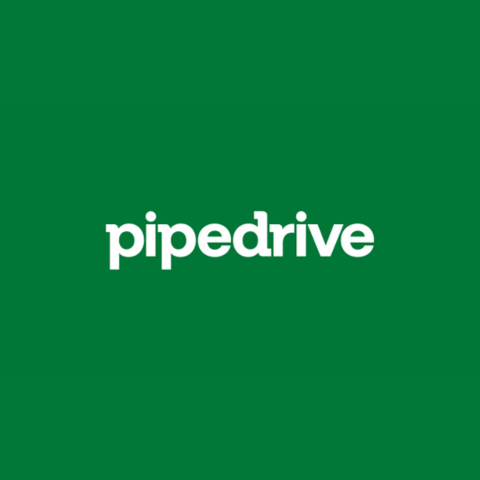 | 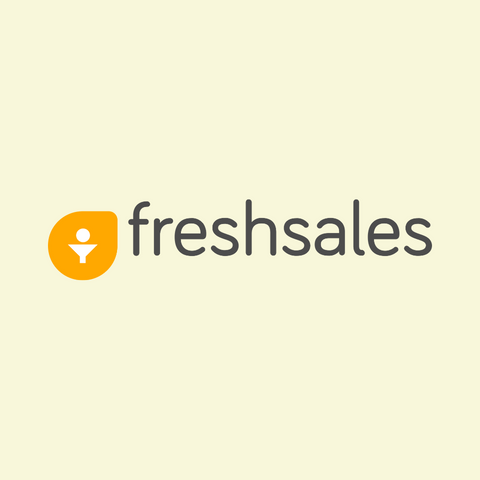 | 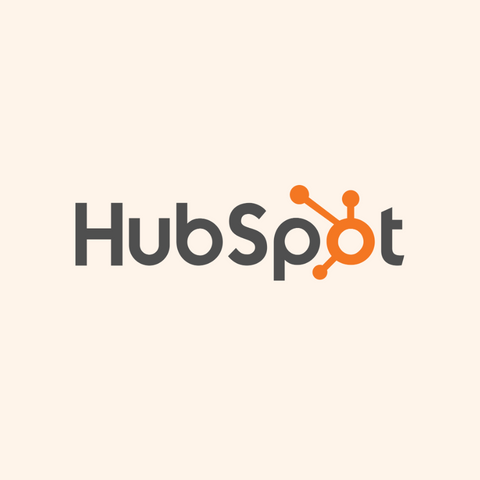 |  | 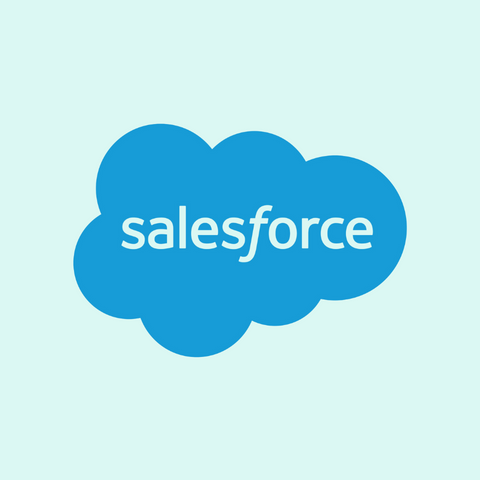 | 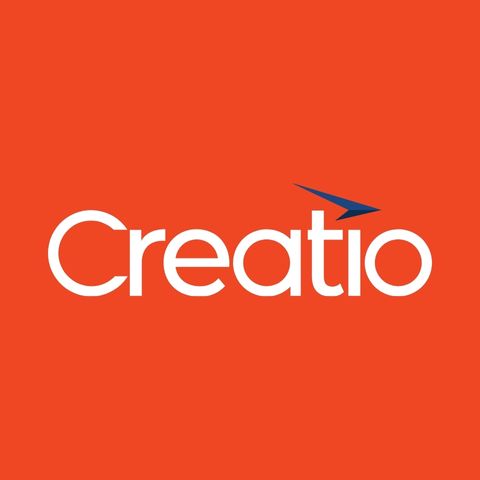 | 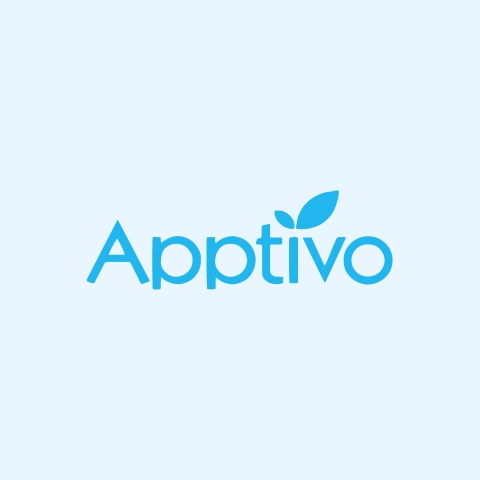 | 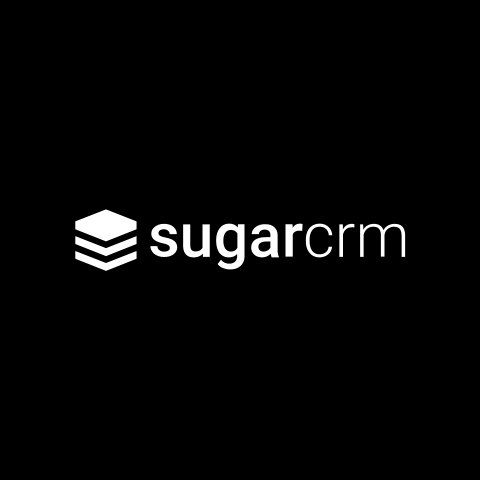 | 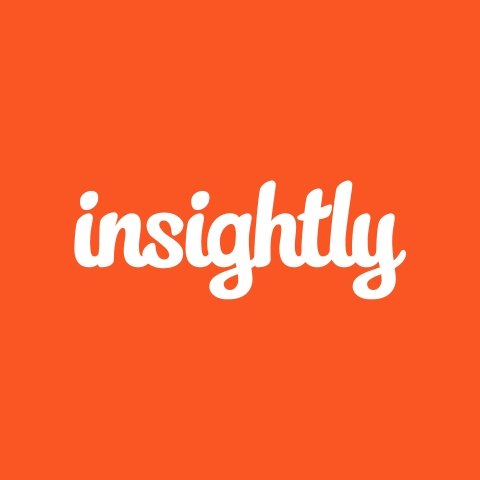 | 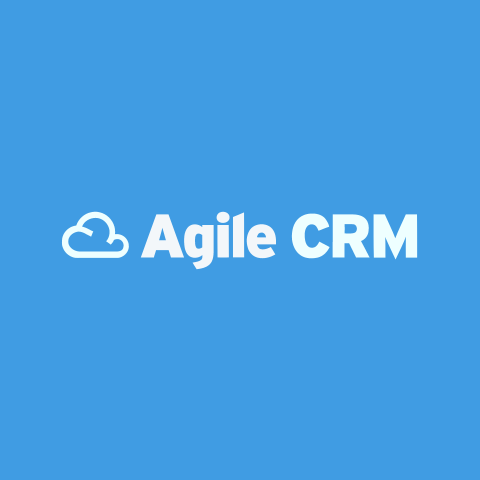 | 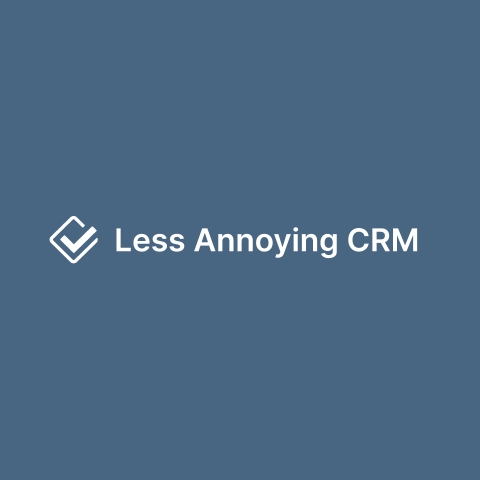 | 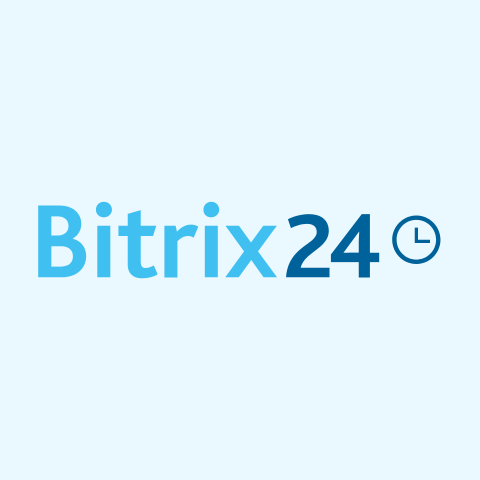 | 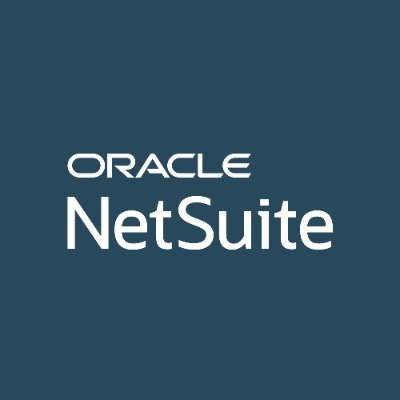 | 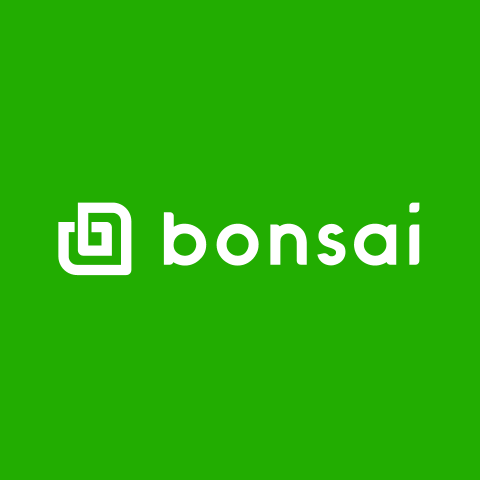 | 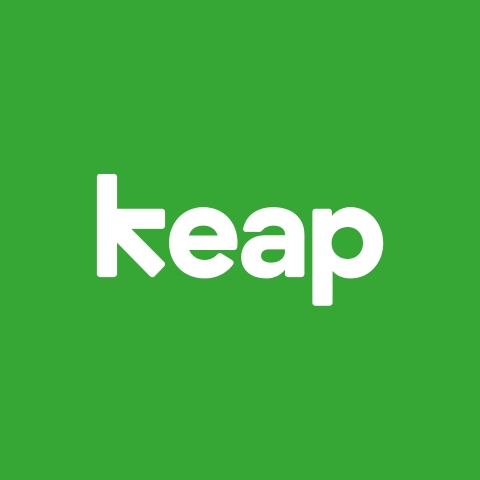 |  | 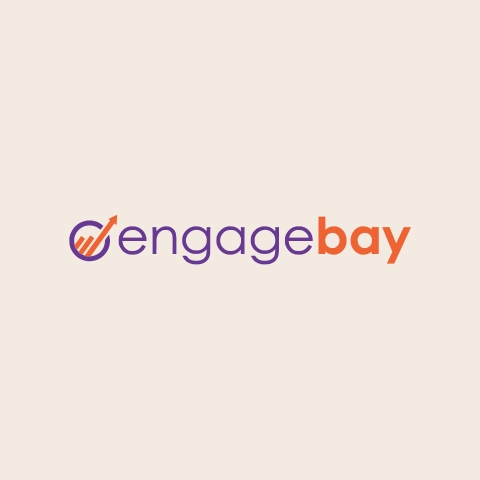 |  | |
Extensive | Moderate | Limited | Limited | Moderate | Moderate | Extensive | Extensive | Moderate | Limited | Extensive | Moderate | Moderate | Moderate | Limited | Limited | Extensive | Extensive | Limited | Moderate | |
Advanced | Advanced | Basic | Advanced | Moderate | Extreme | Advanced | Advanced | Moderate | Moderate | Moderate | Moderate | Basic | Limited | Advanced | Moderate | Advanced | Moderate | Advanced | Moderate | |
200+ | 900+ | 500+ | 1000+ | 1500+ | 1800+ | 300+ | 165+ | 20+ | 200+ | 2000+ | 50+ | 23+ | 550+ | 13+ | 05+ | 27+ (Zapier included) | 48+ | 10+ (Zapier included) | 100+ | |
✅ | ✅ | ✅ | ✅ | ✅ | ✅ | ✅ | ✅ | ✅ | ✅ | ✅ | ✅ | ✅ | ✅ | ✅ | ✅ | ✅ | ✅ | ✅ | ✅ | |
✅ | ✅ | ✅ | ✅ | ✅ | ✅ | ✅ | ✅ | ❌ | ✅ | ❌ | ❌ | ❌ | ✅ | ✅ | ❌ | ✅ | ✅ | ❌ | ✅ | |
$12 | $14 | $14 | $9 | $15 | $19 | $25 | €25 | $15 | $19 | $29 | $8.99 | $15 | $49 | Custom | $9 | $249 | $23 | $12.74 | $13 | |
Geekflare’s editorial team determines ratings based on factors such as key features, ease of use, pricing, and customer support to help you choose the right business software. | ||||||||||||||||||||
1. monday CRM
Best for Small to Medium Businesses
monday CRM lets you track and manage all aspects of your customer journey—from pre-to post-sales. I could easily customize the CRM’s look and feel with flexible column types, customizable views, robust sorting, and more options.
Custom dashboards make tracking real-time data on deal progress, sales figures, and team performance easy. While advanced CRM features such as sales forecasting, team activity tracking, contact management, and no-code automations—streamline the entire relationship management.
Receive real-time alerts when you enter a duplicate lead or account. Or switch to automated lead scoring to organize and prioritize high-value leads accurately.
monday CRM integrations with email providers and social and communication apps allow you to send and receive communications without switching apps. monday CRM hosts a dedicated app marketplace with one-click integrations to 150+ apps.
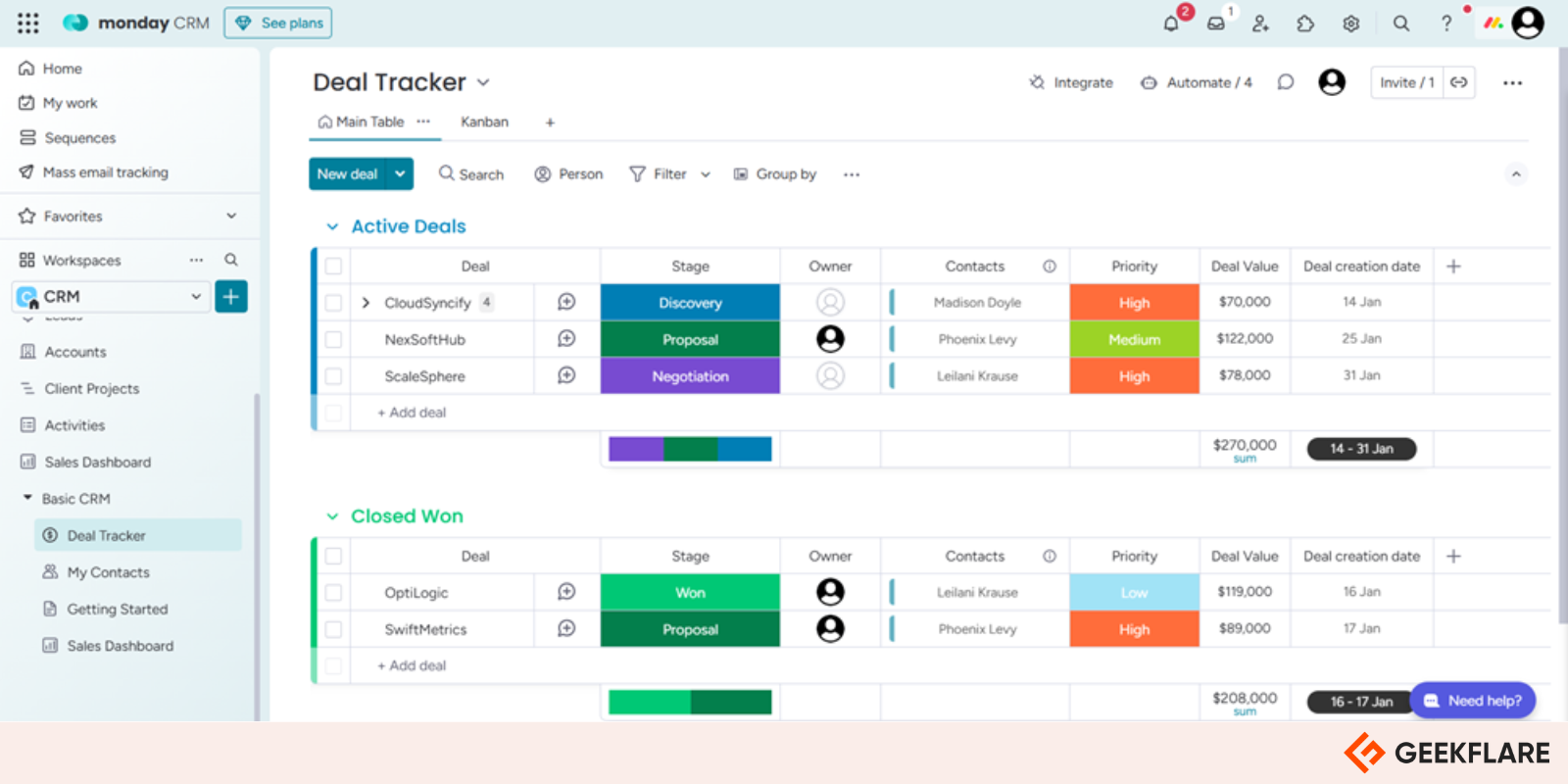
Above is a view of monday CRM, showing a deal tracking interface, featuring an organized table for managing active deals and closed deals. It displays details such as deal stages, owners, contacts, priorities, deal values, and creation dates, allowing you to manage your sales pipeline.
monday CRM has a user-friendly, clean interface that’s easy to navigate. The automation features save time by handling repetitive tasks, and the platform integrates smoothly with other tools.
For more details, please read our monday CRM review for use cases, pros/cons, alternatives, and more.
monday CRM Features
- Consolidate your sales rep and customer data, status, and interaction history into one view
- Use AI to compose, personalize, and analyze emails sent for lead nurturing and follow-ups
- Built-in sales forecasting module analyzes each deal value and closes probability
- Use automated lead scoring to organize and prioritize high-value leads
- Drag-and-drop automation builder to automate any tasks–from email sequences to customer routing and more
Pros
Excellent customer support and online learning resources
Dedicated iOS and Android apps for easy accessibility
AI task automation for menial tasks (e.g., scheduling follow-ups, routing customer queries, etc.)
Cons
In-app navigation is not as easy as other CRMs
No fixed pricing plans for 50+ seats; you have to contact the sales
monday CRM Pricing
monday CRM offers a 14-day free trial to explore its features and functionalities before you go ahead with their paid plans.
- Basic: $12/seat per month
- Standard: $17/seat per month
- Pro: $28/seat per month
- Enterprise: Custom pricing
2. Zoho CRM
Best to Integrate with Zoho Suite
Zoho CRM is a flexible and scalable solution with over 250k+ customers across 150 countries. Especially for startups and small businesses, Zoho is easy to use and secure, and it has demonstrated a 300% improvement in lead conversion rate.
If you’re already part of the Zoho app ecosystem, you will find this the best option. The software integrates well with other Zoho apps, making data importation quick and easy.
With the help of Zoho AI (Zia) and robust automation tools, you can accomplish almost all monotonous and analytical tasks. Think about deal predictions, sales forecasting, composing emails, automated routing and workflows, contact management, and more.
On top of AI and automation, I liked Zoho’s journey orchestrations. With a drag-and-drop visual editor, I could define my customer’s cross-platform journeys and develop personalized brand responses.
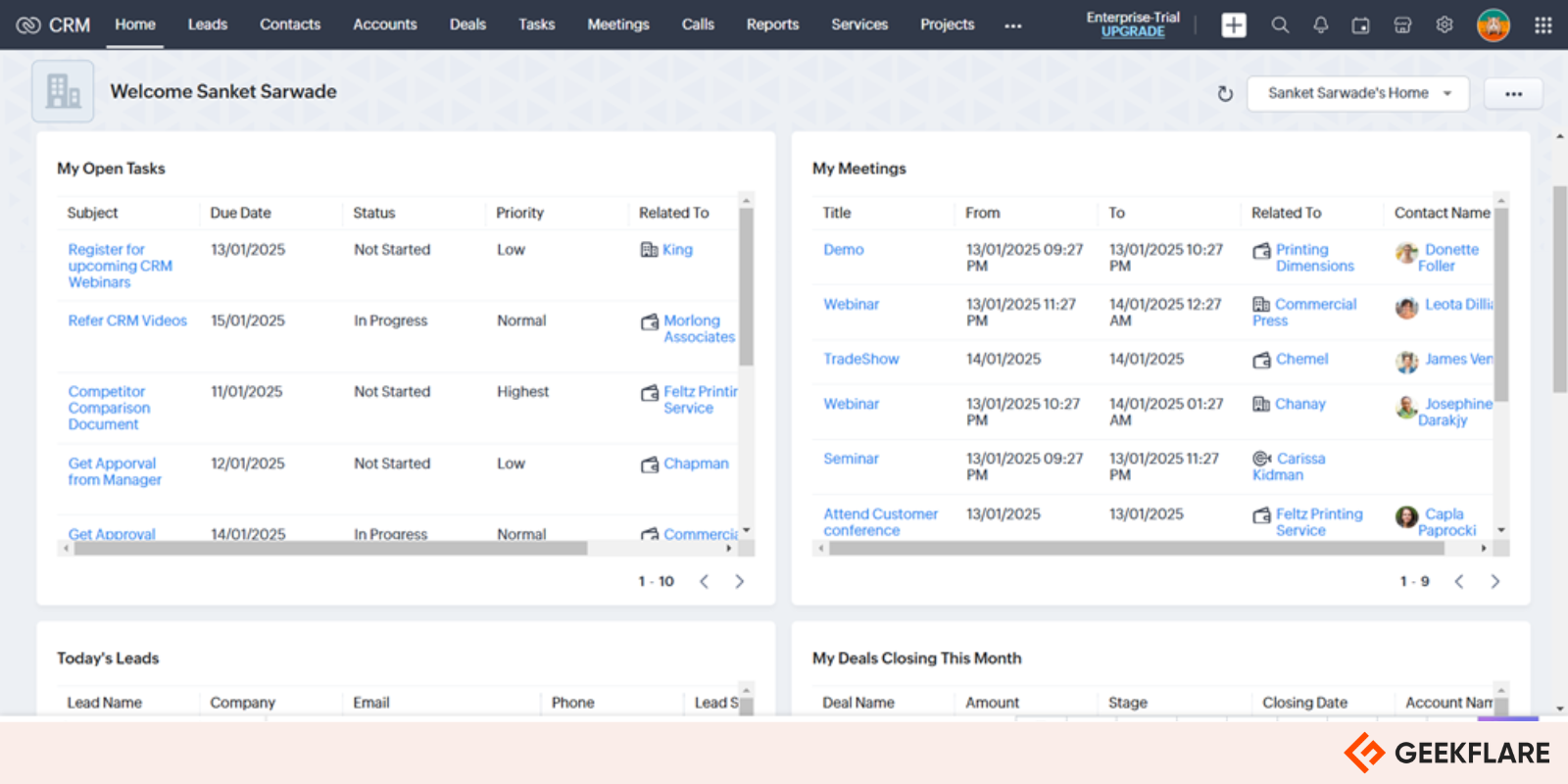
The dashboard of Zoho CRM offers a clear overview of the user’s open tasks, upcoming meetings, today’s leads, and deals closing within the month. It provides a centralized view to effectively manage customer interactions and sales activities.
Zoho CRM Features
- Control all communication channels, including email, social media, live chat, and telephony, from a centralized hub
- Use Journey Maps to visualize customer journeys in real-time and gather insight into your customers’ preferences
- Automate management processes like lead routing, follow-up emails, review processes, and more
- Enterprise-grade security with role-based access control, audit logs, vaults, real-time data backups, and encryption
Pros
50% faster set-up time than the industry average
Integration with 200+ apps
75+ built-in visualizations, including pivot tables
Cons
Software has a learning curve due to its range of features
You have to download several apps if you want to use Zoho’s CRM and its other tools on your mobile device
Zoho CRM Pricing
Zoho CRM is free for up to three users and essentials like lead and contact management, documents, standard reports, and mobile apps. However, Zia and advanced CRM features are only available at premium subscriptions.
- Standard: $14/user/month
- Professional: $23/user/month
- Enterprise: $40/user/month (Zia – AI Assistant)
3. Pipedrive CRM
Best CRM for Lead Management
Pipedrive is a sales CRM solution helping 100k+ companies boost sales momentum and conversion rates. It has a real-time progress tracker, sales automation tools, procession forecasting, and an entire set-up for relationship management.
With a built-in lead database, you can automatically find and fill in information about customers available to the public on the web. It also has web forms and chatbots for efficient lead capturing.
Pipedrive has an AI interface, with features like an AI-powered sales assistant and AI email creation, which generate personalized emails based on user-defined criteria, as you can see below.
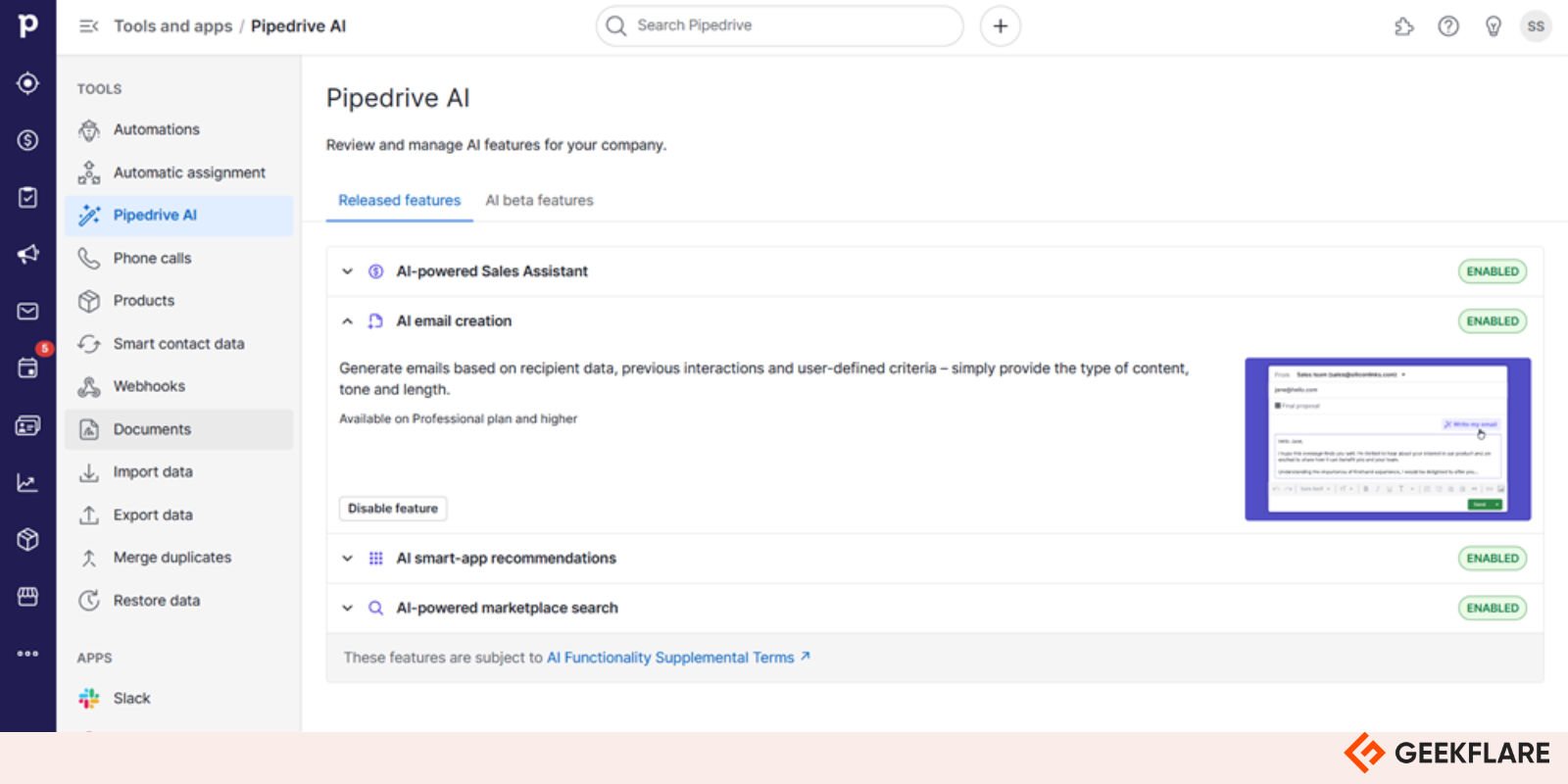
My two cents – I like the visual clarity of Pipedrive. It’s easy to use and implement. However, you will find limited customization options. I’ve reviewed Pipedrive in detail.
Pipedrive CRM Features
- Built-in lead information system that scans the web for contact details, such as email address, industry, job profile, and more
- Access to multiple views, color-coded labels, and other customization options for easy visibility into your sales pipeline
- Tools like forecasting, goal-setting, team monitoring, and preset sales metrics help you to make swift, informed decisions
- Automate lead scoring on any pre-defined criteria and optimize your pipeline for better conversion rates
- View, reply, and manage messages from WhatsApp or Facebook directly within Pipedrive
Pros
Automatic merging of duplicate customers
Quick support from the team
In-depth lead prospecting and trends analysis
Cons
Users at G2 reported that you cannot link the same contact with more than one company
Lacks built-in dialing capabilities and relies on third-party apps
How much does Pipedrive cost?
Pipedrive pricing starts at $14/seat per month and has 5 subscription tiers as mentioned below. Each plan has a 14-days free trial.
Pipedrive promo: get 20% OFF for 12 months.
- Essential: $14/seat/month
- Advanced: $39/seat/month
- Professional: $49/seat/month
- Power: $64/seat/month
4. Freshsales CRM
Best to Integrate With Freshworks Products
Freshsales is a balanced sales CRM with a fairly low pricing point. I recommend it for businesses with moderate customer interactions (50-100 messages/calls per day) who need powerful sales pipeline management and basic marketing automation.
You can choose from different views —Kanban, List, Grid, Calendar—to view your sales pipeline. Simple drag-and-drop cards across stages and keep your sales funnel in motion.
Use Freddy AI to autofill customer information or automate any sales process, from writing emails to routing calls to the right sales rep. Freshsales spreads AI across various functions rather than centralizing it.
The contact management interface of Freshsales CRM displays detailed information about the contacts and sales statuses. It allows users to categorize contacts with tags like “Decision Maker” and “Influencer” while tracking their progress through the sales pipeline.
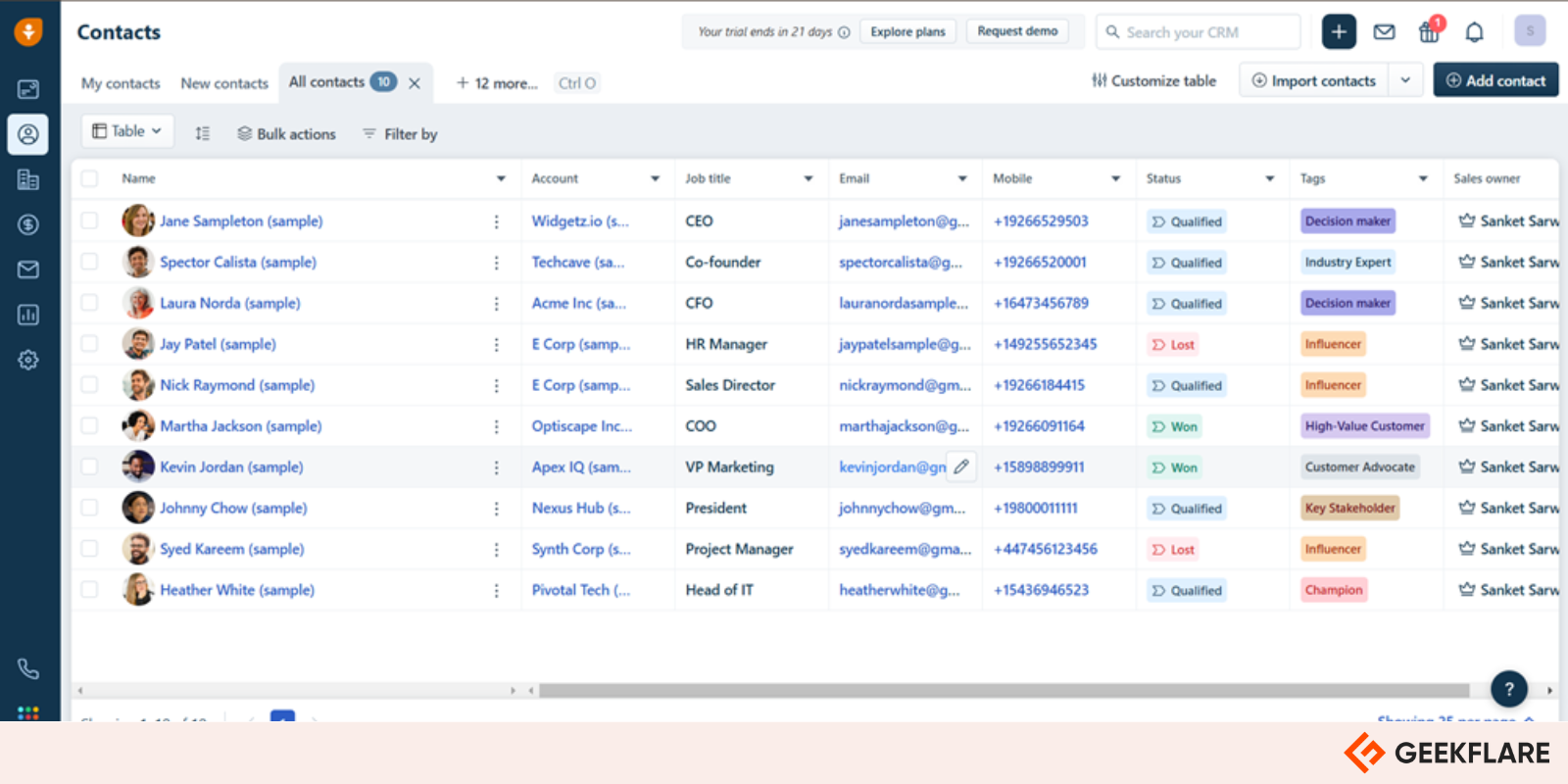
Freshsales users are positive about ease of use and reliable customer support.
Read our detailed review of Freshsales sales CRM software
Freshsales Features
- Enrich contacts with relevant information from social media and public sources
- Track prospects through their buying journey with unique contact lifecycle stages and substages
- Gain insights into sales performance and customer interactions via detailed dashboards and reports
- Appoint Freddy AI for lead scoring, prioritization, sales forecasting, and deal predictions
- Use IntelliAssign to auto-route conversations to the right customer expert or team based on skill level, conversation limits, and other factors
- Integrate LinkedIn’s extensive network of professionals and businesses right within your Freshsales workflow
Pros
Easy to visualize, adjust, and create your sales pipelines
Built-in phone, live chat, and communication tools
Integrated AI capabilities across the board
Cons
Limited to 5000 marketing contacts (Enterprise plan)
Generating reports is cumbersome and inflexible
Freshsales Pricing
There is a free plan for up to three users. And three premium plans:
- Growth: $9/user per month
- Pro: $39/user per month
- Enterprise: $59/user per month
5. HubSpot CRM
Best for Sales Funnels
HubSpot helps 200k+ teams across Reddit, DoorDash, AND WWF—organize, prioritize, and engage new and existing customers.
You can store and access all lead-related information and past journeys from a single pane of glass view. HubSpot also has a robust contact management system. It has tools for daily prospecting, smart send times, and automatic lead rotation.
I like how my sales activities are in sync with my Gmail and Outlook. I could integrate over 1,500 other apps into my sales pipeline – including Google Contacts and LinkedIn Sales Navigator.
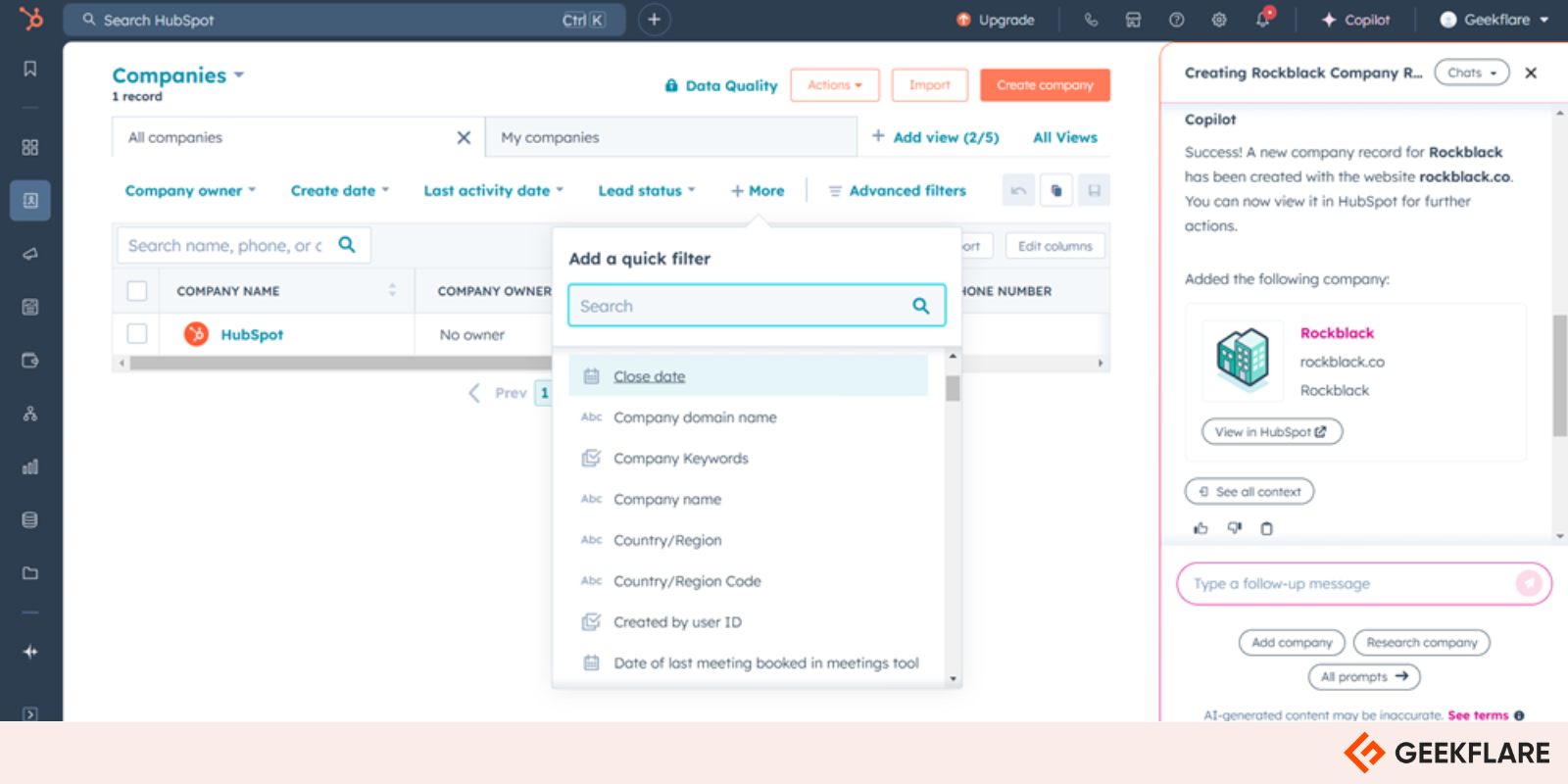
HubSpot’s company management interface lets users filter and organize company records with advanced options like close dates, domain names, and regions. On the right, the Copilot feature assists by automating tasks such as creating new company records, providing real-time confirmations, and offering actionable follow-up suggestions for seamless customer management.
HubSpot Features
- Automatically prioritize leads with custom scoring criteria
- Grow your database with smart segmenting and nurturing features
- Build a library of sales content for your team to share, and track which documents close deals
- Use contacts’ histories to create segments based on website visits, email interactions, and more touchpoints
- Built-in reporting tools that allow users to track lead generation performance and analyze conversion rates
- Set up workflows to route leads to the right reps and trigger personalized marketing content and email campaigns
Pros
Free CRM plan with one million contacts and unlimited users
Ability to create payment links to receive your money faster; especially useful for freelancers and SMBs
Free email templates and building tools for chatbot, website, and landing pages
Cons
$4000 onboarding fee for HubSpot Enterprise
Some learning curve for new users
HubSpot Pricing
You can start with a free version (up to two users). The free version includes unlimited data and the ability to store up to one million contacts for as long as you want. Other plans include:
- Starter: $15/seat per month
- Professional: $1170 per month (five seats)
- Enterprise: $4300 per month (seven seats)
6. Zendesk Sell
Best for Helpdesk Integrations
Zendesk is a revenue driver CRM focusing on data transparency, easy sales, and support management. It streamlines customer support operations through its live chatbots and robust ticketing system, which allows businesses to manage inquiries efficiently.
You can create a searchable Knowledge Base with content about your products or services in multiple formats.
This allows answering common customer questions and helps customers self-troubleshoot problems. Turns out 51% of consumers prefer quicker answers via product FAQs over human intervention, so brownie points for this feature.
Whether you want to support customer support with AI or manage multiple sales pipelines, Zendesk provides a strong foundation with its sales forecasting, automatic price regulation, and smart quotations, which factor into your profitability.
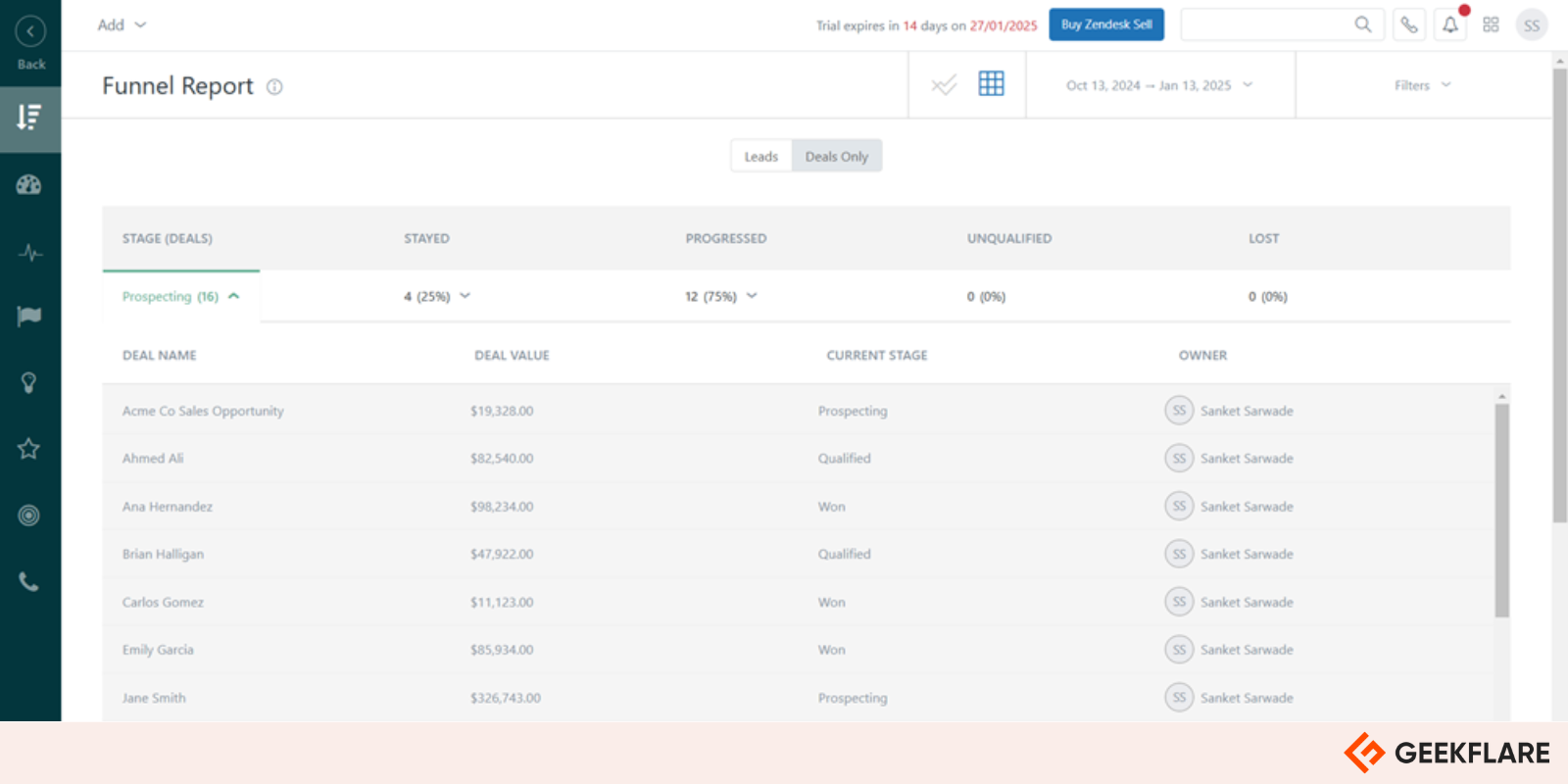
The Funnel Report feature in Zendesk CRM, as shown above, provides a detailed breakdown of deals across various sales stages such as Prospecting, Qualified, and Won. It offers insights into deal values, progression rates, and ownership, helping sales teams track performance and optimize their pipelines effectively.
However, the many features can be a bit overwhelming initially, and I’ve sometimes experienced slowdowns. Customization options, like creating brand-specific email templates, are also limited in certain areas.
Zendesk Sell Features
- Centralized ticketing system management of customer requests across multiple communication channels
- Mobile-first interface helps your team log calls, messages, notes, or access information on the go
- Offers a self-serve knowledge base for customers to find answers independently
- Reporting and analytics provide accurate data modeling and pipeline diagnosis
Pros
Integrate 200+ apps (e.g., Mailchimp and Zoho CRM)
Customize your interface to focus on leads and deals
Advanced AI add-on to automate workflows
Cons
No free version
Lacks email marketing capabilities
Zendesk Sell Pricing
Zendesk Sell offers per agent per month plan. It offers a 14-day evaluation trial before you activate your paid plans. The paid plans are as follows:
- Sell Team: $19/month
- Sell Growth: $55/month
- Sell Professional: $115/month
7. Salesforce CRM
Best Overall
Salesforce is a dominant CRM solution when it comes to enterprise SaaS. With huge community backing and never-ending event marketing, Salesforce has positioned itself as the customer-first CRM.
Enterprises primarily choose Salesforce when they have a boatload of internal workflows and procedures that need custom-building and future modification. It’s known for handling enormous amounts of data and rendering insights and correlations in a simple yet sophisticated way, the way enterprises like it.
With an array of first and third-party tools ready to be integrated – Slack, Atlassian, Google Suite, Microsoft, and any tool you might want to plug it with.
Salesforce CRM’s lead management interface offers detailed insights into a lead’s status, contact information, and campaign history.
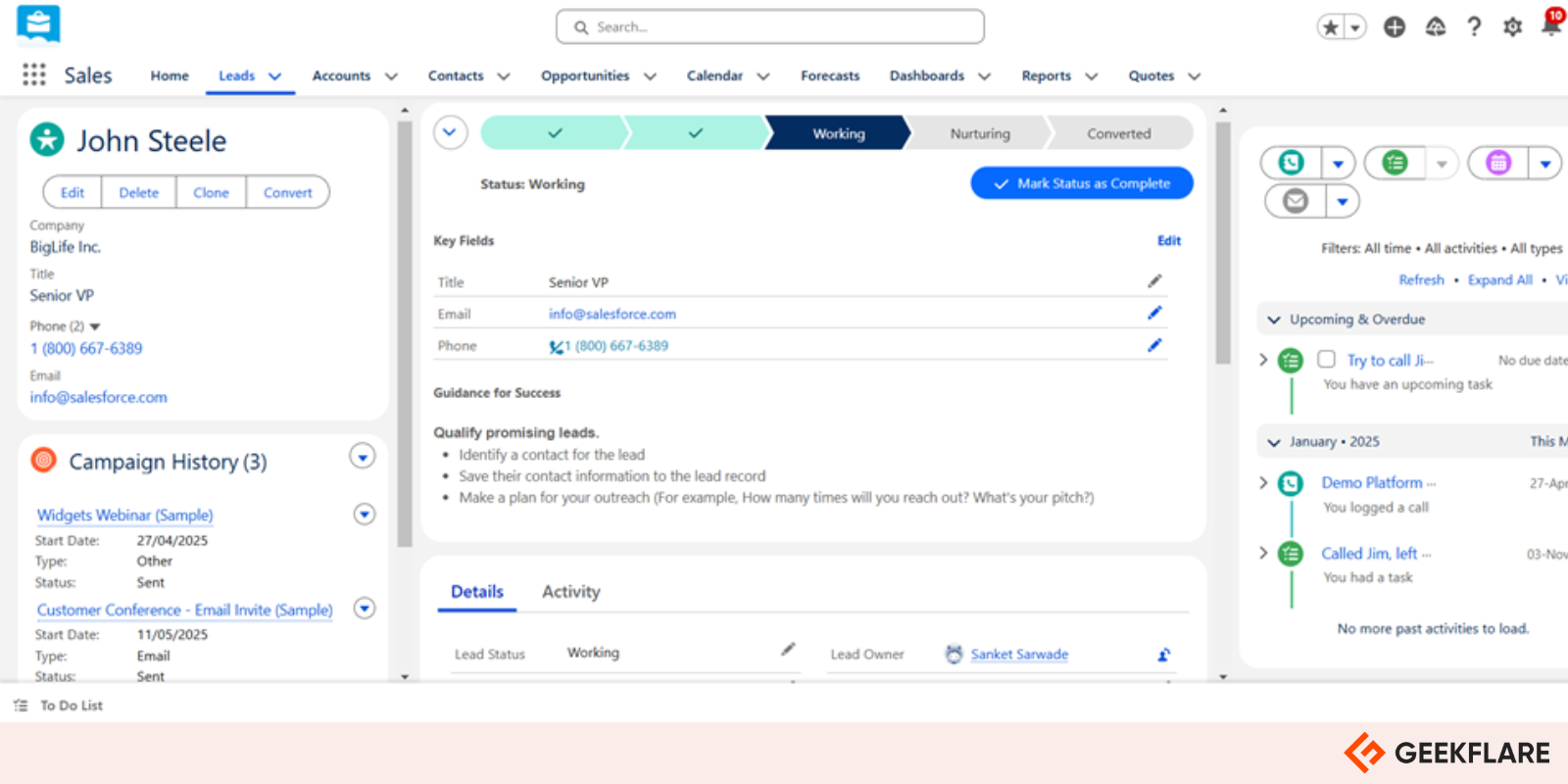
A lead status progress bar visually tracks the lead’s journey, currently in the “Working” stage, with options to update it to “Nurturing” or “Converted.” On the right, the activity panel lists upcoming tasks, such as follow-up calls, and previously logged activities, enabling users to manage deadlines and interactions effectively. This comprehensive layout ensures sales reps can access all necessary data and guidance for successful lead conversion.
Hands down, I like how it provides the best advanced customer profiling, sales pipeline management with efficiency insights, and AI-powered customer relationship management.
Automating tasks like lead management and follow-ups saves time and lets the team focus on strategic activities. However, the customization process can be tedious and time-consuming. Sometimes, finding specific information is tricky, depending on how the system was initially set up.
Salesforce CRM Features
- Use predictive AI for sales forecasting and lead opportunity management
- Revenue Cloud helps you deliver the right product quotes and upsell opportunities to boost deal size and value offerings
- Service Cloud makes customer service a delightful experience with self-service tools and conversational intelligence based on FAQs
Pros
Flexible and scalable as your business grows
Robust analytics and reporting tools
Einstein 1 platform helps update customer interest segments, integrate security, etc.
Cons
AI can be integrated as an add-on (paid)
Most plans only have annual subscriptions
Customizing and adopting the platform can be overwhelming
Salesforce CRM Pricing
Salesforce CRM offers pricing plans for both SMBs and enterprises and are listed below.
- Starter: $25/user/month
- Pro: $100/user/month
- Enterprise: $165/user/month
- Unlimited: $330/user/month
- Einstein 1 Sales: $500/user/month
8. Creatio CRM
Best for Customer Journey Automation
Positioned as the first no-code CRM for marketing, sales, and services—Creatio has gathered decent attention from Forrester and Gartner Magic Quadrants.
Creatio offers no-code tools for customizing its core modules. You’ll find tools for UI/UX development, workflow automation, data modeling, integrations, and more. It’s easy to customize without needing technical skills, and the user-friendly design makes it simple to use.
I will give the brownie points to the Creatio AI command center, which acts as a hub to create, deploy, and manage AI modules across departments and teams.
A major part of Creatio AI works on natural language prompts. So, it was easy to analyze lead opportunities or automate any process via simple prompts.
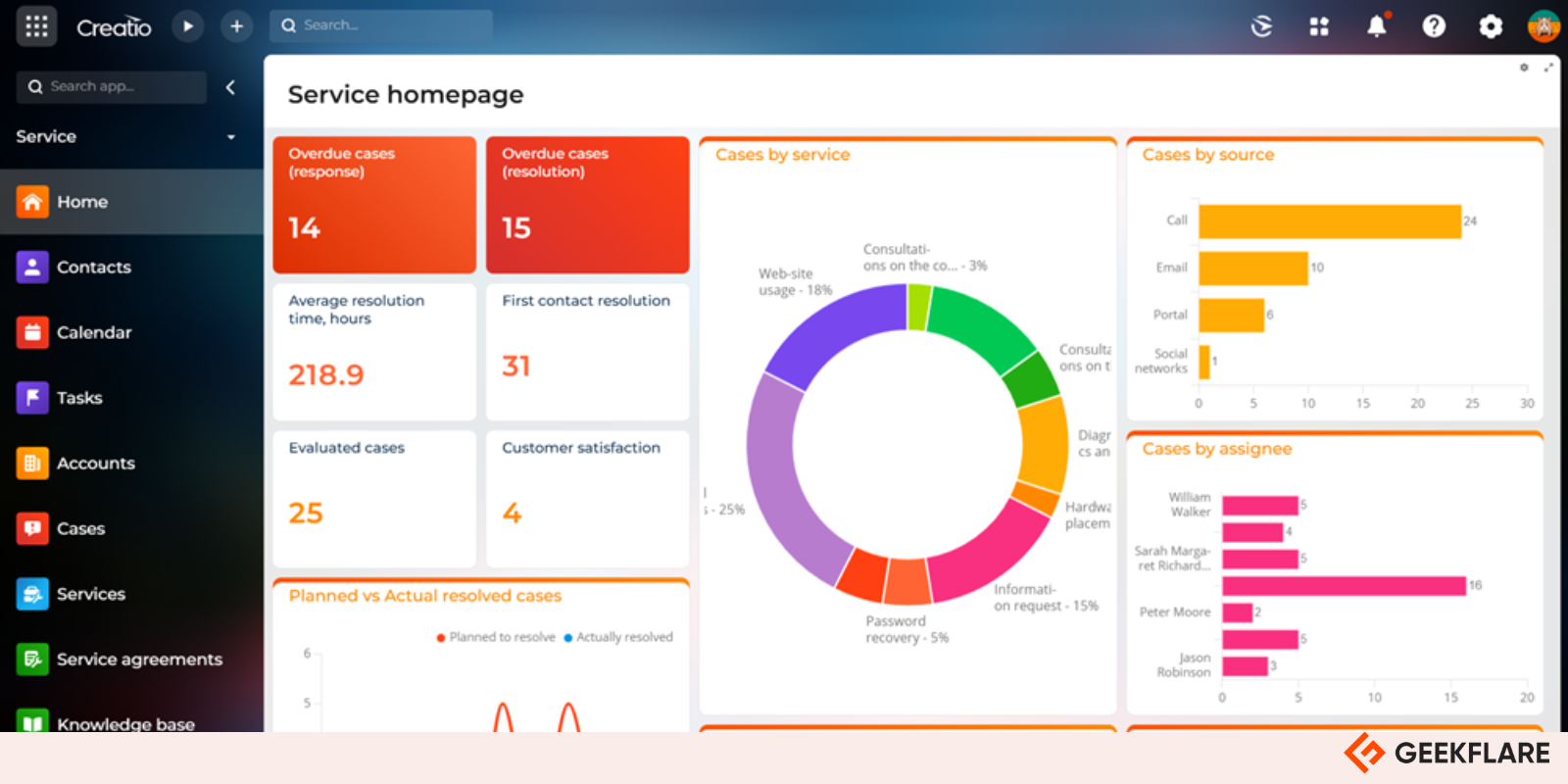
The Service homepage of Creatio CRM has an overview of key support metrics such as overdue cases, average resolution time, and customer satisfaction scores. It features detailed visualizations, including a pie chart for cases by service, bar charts for cases by source and assignee, and a graph comparing planned vs. actual resolved cases.
Creatio CRM Features
- Create and manage multi-channel marketing campaigns of any type and complexity
- Use campaign designer to frame your campaign budget, launch, and measure response in real-time
- Easily integrate with big data and business intelligence tools like Power BI, Looker, Tableau, and more
- Comprehensive order invoicing and contract management modules for your sales and finance teams
Pros
No-code tools make it easy to navigate and customize reports
Offers Robust API support when integrating with standard marketing platforms, as per user reviews on G2
Event management tools (e.g., sales predictions, expected ROI) to help plan in advance
Cons
While it’s no code, there’s still some learning curve
Pricing may be steep for cost-conscious businesses
Creatio CRM Pricing
Creatio offers a 14-day free trial with premium subscriptions:
- Growth: €25/user per month
- Enterprise: €55/user per month
- Unlimited: €85/user per month
9. Apptivo CRM
Best CRM for Travel and Real Estate Industry
Apptivo offers several modules for contact management, campaign optimization, and helpdesk management. It has a suite of apps for sales and marketing teams in the travel and real estate industries.
Marketing app suites include campaign management, lead segmentation, and loyalty management. In contrast, sales apps include expense reports, sales planning and territory management, cash management, and budgeting.
Apptivo CRM lets you create estimates within the app. A great feature for travel agencies or real-estate brokers. You can easily add applicable taxes to contracts and proposals to ensure that both parties are legally covered.
The CRM also has comprehensive tools to help you break down reports into more bite-sized periods, such as the opportunities you want to add (e.g., whether someone is a potential “yes” for your next sale).
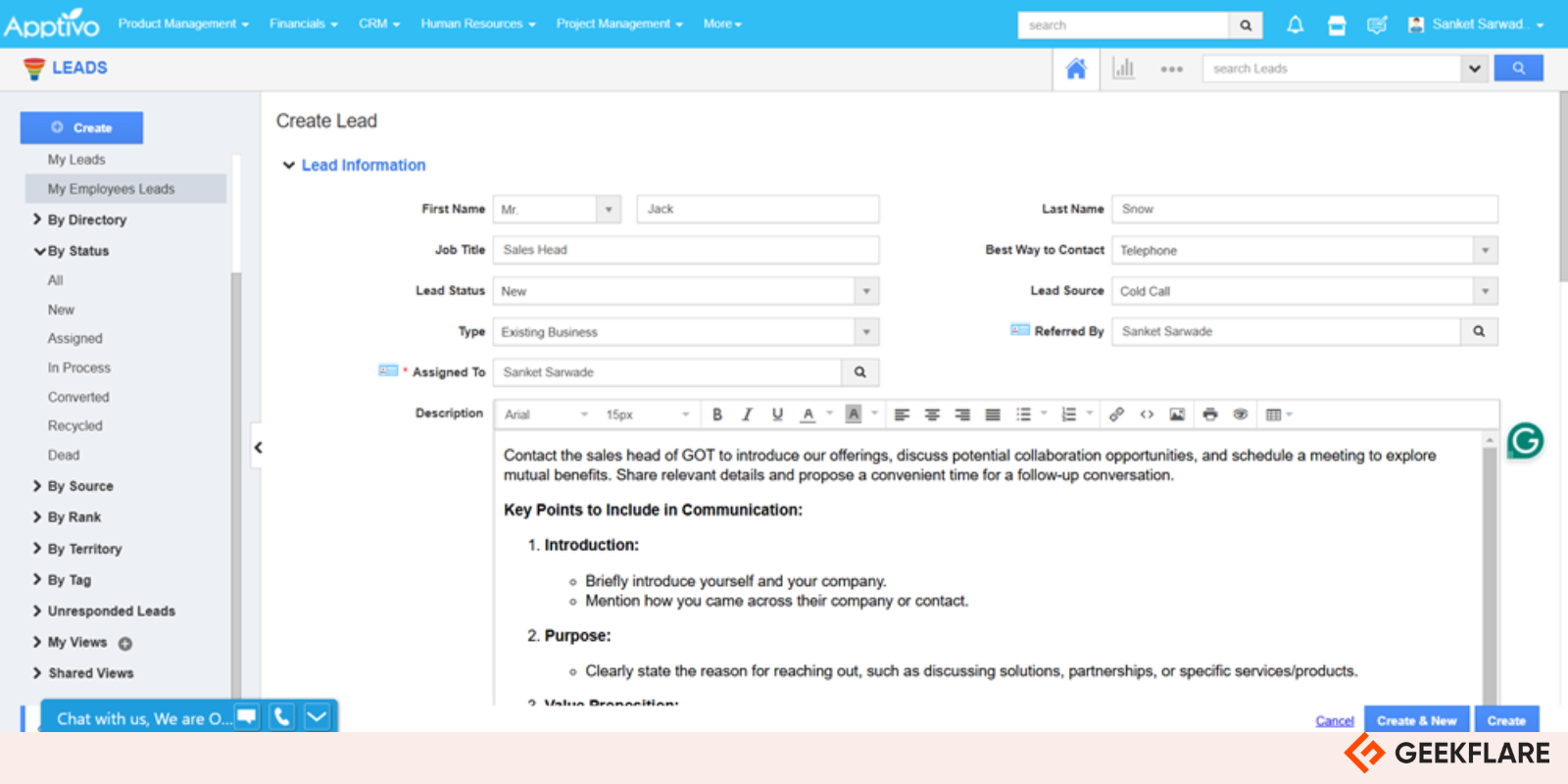
The lead creation interface in Apptivo CRM allows users to input detailed information about a new lead, including name, job title, contact preferences, lead source, and assignment to a team member. The description section provides a space for personalized communication plans and key points, making it easier for sales teams to organize and follow up on leads effectively. However, during my testing, I struggled with importing data, and found it lacking in advanced customization options compared to other CRMs.
Apptivo CRM Features
- Organized lead management with a round-robin assignment, lead scoring engine, and a routine lead qualification cycle
- Simplified contact directory with routine task manager, email, and SMS workflows
- Integrates with finance tools and payment gateways like Stripe, PayPal, Xero, and Quickbooks
- Out of box invoicing features with support for subscription billing and recurring invoicing
Pros
24/7 customer support, with a dedicated knowledge base and live chat support
Access Google app integrations for Drive, Calendar, and Task
Quick mobile access for field teams
Cons
Support team is slow at resolving billing disputes
I found the interface somewhat unintuitive, making navigation difficult
Apptivo CRM Pricing
Apptivo CRM offers a 30-day free trial and does not require a credit card. Here are the plans.
- Lite: $15/user per month
- Premium: $25/user per month
- Ultimate: $40/user per month
- Enterprise: Custom pricing
10. SugarCRM
Best for Marketing and Sales Automation
SugarCRM positions itself as the ‘Mid-Market CRM,’ meaning it is for companies larger than small businesses but smaller than MNCs. This smart segmentation gives SugarCRM the advantage of designing features for a specific business segment. It is also on the pricier end, like the extremely pricer end.
SugarCRM emphasizes time and customer awareness. You’ll find more features on customer documentation, such as events, activity, goals, interactions, and historical behavior. It also stresses the importance of building complete customer metadata over time.
SugarCRM does not offer a free trial. Users have reported a steep learning curve, rigorous integration, and implementation cycles. But the effort pays off when you understand how feature-rich the CRM is.
SugarCRM Features
- SugarSell enables your sales teams to focus on boosting win rates and helps shorten the average sales cycles
- Use SugarCRM’s predictive AI engine for reporting and forecasting
- Dubbed revenue intelligence, SugarCRM also locates difficult-to-reach prospect data
- Leverage automation and design workflows to chart campaigns and engagement strategy
- Provides smart self-service and knowledge base support with AI-powered customer support management
Pros
Intuitive and straightforward to set up
Dedicated iOS and Android CRM app
Automation at every step of your sales process
Geo mapping tools to get a better overview of prospects
Cons
Users have complained of the UI being it clunky and outdated
You may find it hard to integrate various modules and systems within SugarCRM
SugarCRM Pricing
SugarCRM offers four different pricing plans to choose from based on its feature set.
- Essential: $19/user/month
- Standard: $59/user/month
- Advanced: $85/user/month
- Premier: $135/user/month
11. Insightly
Best for Remote Teams
Insightly is a modern-day CRM that builds lifelong customer relationships. Setting up customizable sales pipelines, Kanban views, and workflow automation is easy. Manage projects with features such as milestones, task assignments, and progress tracking.
Insightly CRM is easy to use. It helps me keep leads, contacts, and projects organized, and the email integration makes communication simpler. The automation and sales reports save me time.
The lead management interface in Insightly CRM lets users view a comprehensive list of leads with details such as names, job titles, organizations, phone numbers, and lead statuses. The right panel offers quick actions like importing/exporting leads, merging duplicates, and tagging for efficient organization and tracking of sales prospects.
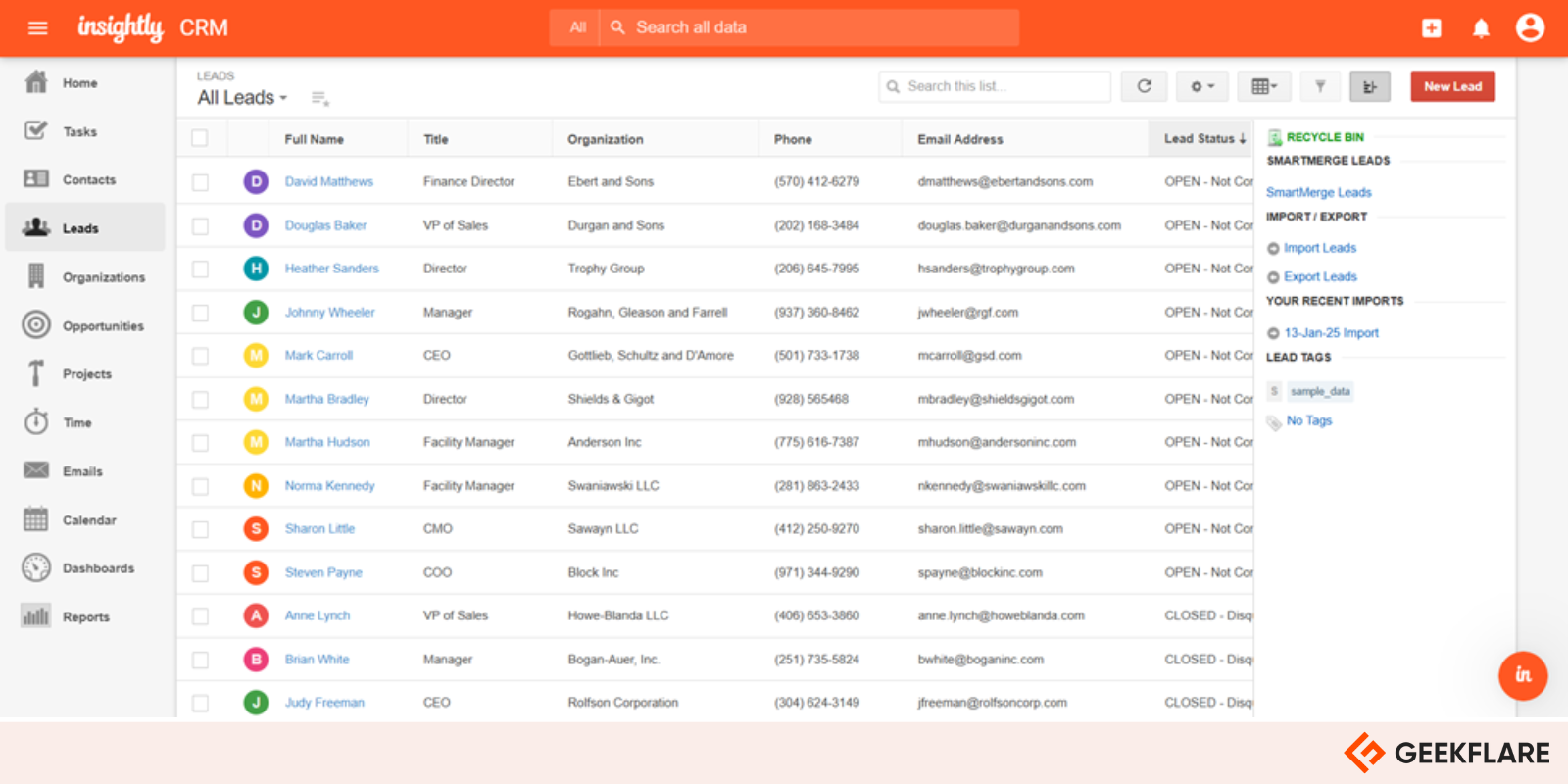
I wish there were more customization options, and the reporting could be better. Occasionally, it’s a bit slow with large datasets.
I am also disappointed by the lack of AI features at the time of writing this article. It’s a must-have when other CRMs are gearing up with AI. Besides that, Insightly is loaded with all the essential features for customer relationship management.
Insightly Features
- Create real-time sales dashboards with customizable charts and visuals
- Use App Connect to link your CRM with the top eCommerce solutions like Shopify, Magento, WooCommerce, and 1000+ other tools
- Automate business workflows and processes such as email, reminders, and onboarding stages to increase productivity
- Use opportunity management to create deal velocity, configure and price quotes directly from opportunity records
Pros
Easily create custom objects and fields to suit your business requirements
Integrations with Facebook, Shopify, and native CMS
Beautiful dashboards and reports
Advanced permissions (e.g., organization-wide sharing) and data compliance improvements
Cons
Trouble customizing reports with certain statistical values or settings
Each core plan has limits on records per import, daily mass emails, and custom fields
Insightly Pricing
You can try the CRM with a 14-day free trial, after which, you can choose from its paid plans.
- Plus: $29/user per month
- Professional: $49/user per month
- Enterprise: $99/user per month
12. Agile CRM
Good FREE Plan
Agile CRM is attractive if you want complete yet affordable CRM software. It integrates sales, marketing, and service management into a single platform.
Your sales team can benefit from contact and deal management, prospecting, lead scoring, and CRM reporting. It offers sales automation tools, like deal tracking, appointment scheduling, and telephony features.
Alongside, your peers in the marketing and support department benefit from automated PPC campaign management, helpdesk coverage, email, and social media marketing modules.
I like the gamification elements—adding leaderboards, badges, ranks, and more items to gamify the sales process. This has worked wonders for my team–it breaks the ice and encourages friendly competition within teams.
Agile CRM also has project management features. For example, you get a screen-sharing add-on. Track analytics like money won and revenue graphs. Access contacts right from the dashboard. Use labels and pictures for easy search.
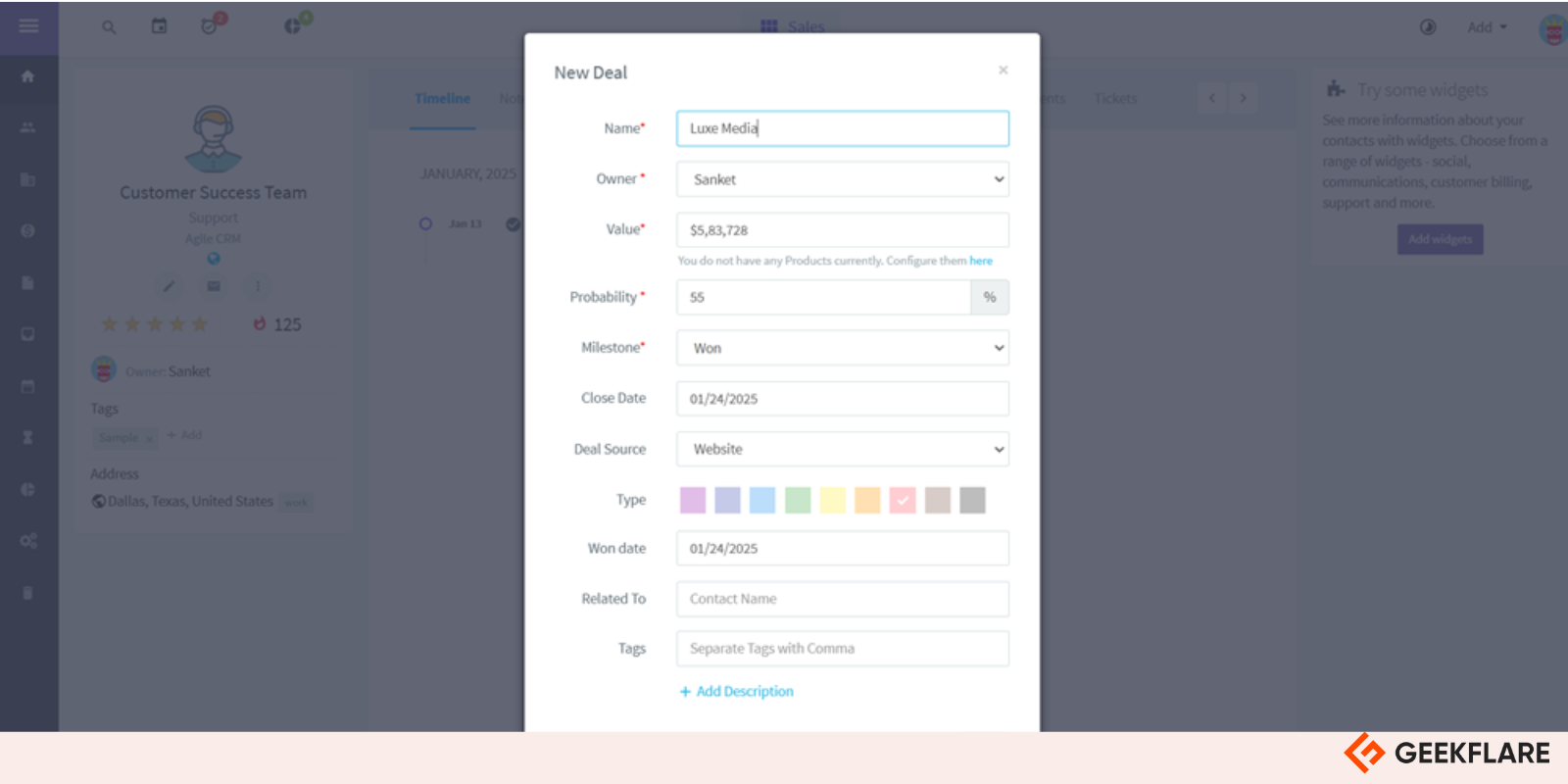
The above image shows the deal creation interface in Agile CRM that lets users input crucial details such as the deal name, owner, value, probability, milestone, and close date. It also provides options for categorizing the deal by source and type, enabling sales teams to track and manage high-value opportunities effectively within the pipeline.
I’ve also noticed some limitations. The reporting tools are basic compared to other CRMs like Freshsales, and it lacks the advanced features and customization options of tools like HubSpot or Zoho.
Agile CRM Features
- Advanced marketing automation capabilities with a drag-and-drop interface for creating workflows
- Drag-and-drop project management functionalities for managing contacts and tasks efficiently within the CRM environment
- Excellent at document handling and customer communications, be it via email, social media, or telephony channels
- Built-in customer support analytics offers real-time visibility into CSS and more metrics
Pros
Allows you to gamify your sales efforts
Advanced social listening module alerts when your business name pops up anywhere on the web
Project management features (e.g., time-tracking and screen capture extension)
Two-way telephony and email integration
Cons
Slow loading times and performance issues, especially with larger datasets
Most integrations and plugins are available with the Enterprise plan
Agile CRM Pricing
Agile CRM is free for up to 10 users and 50,000 contacts. To scale, you can choose from its premium plans:
- Starter: $8.99/month
- Regular: $29.99/month
- Enterprise: $47.99/month
13. Less Annoying CRM
Best CRM for Startups
Less Annoying CRM, or LACRM, is a simple tool for storing contacts, tracking communication, and setting up tasks and reminders for your team. I won’t mind saying the software lives up to its name.
However, compared to feature-rich CRMs like FreshSales and HubSpot, this tool is limited as a CRM. I couldn’t find advanced features like lead enrichment, scoring, built-in marketing capabilities, and advanced automation, which might top the feature list for many businesses.
Navigation can feel slow at times, which can be frustrating when I’m in a rush. Importing and exporting data isn’t always smooth, and there’s no bulk update option, so tasks like merging contacts take extra time. The reporting tools are quite basic, which might not work for those needing detailed analytics.
On the brighter side, you will get essential features like built-in calendars for appointment scheduling and event alerts. Regular lead reports and tasks digest via email. Options for custom fields and report customization. It offers cloud access for uninterrupted customer management across devices.
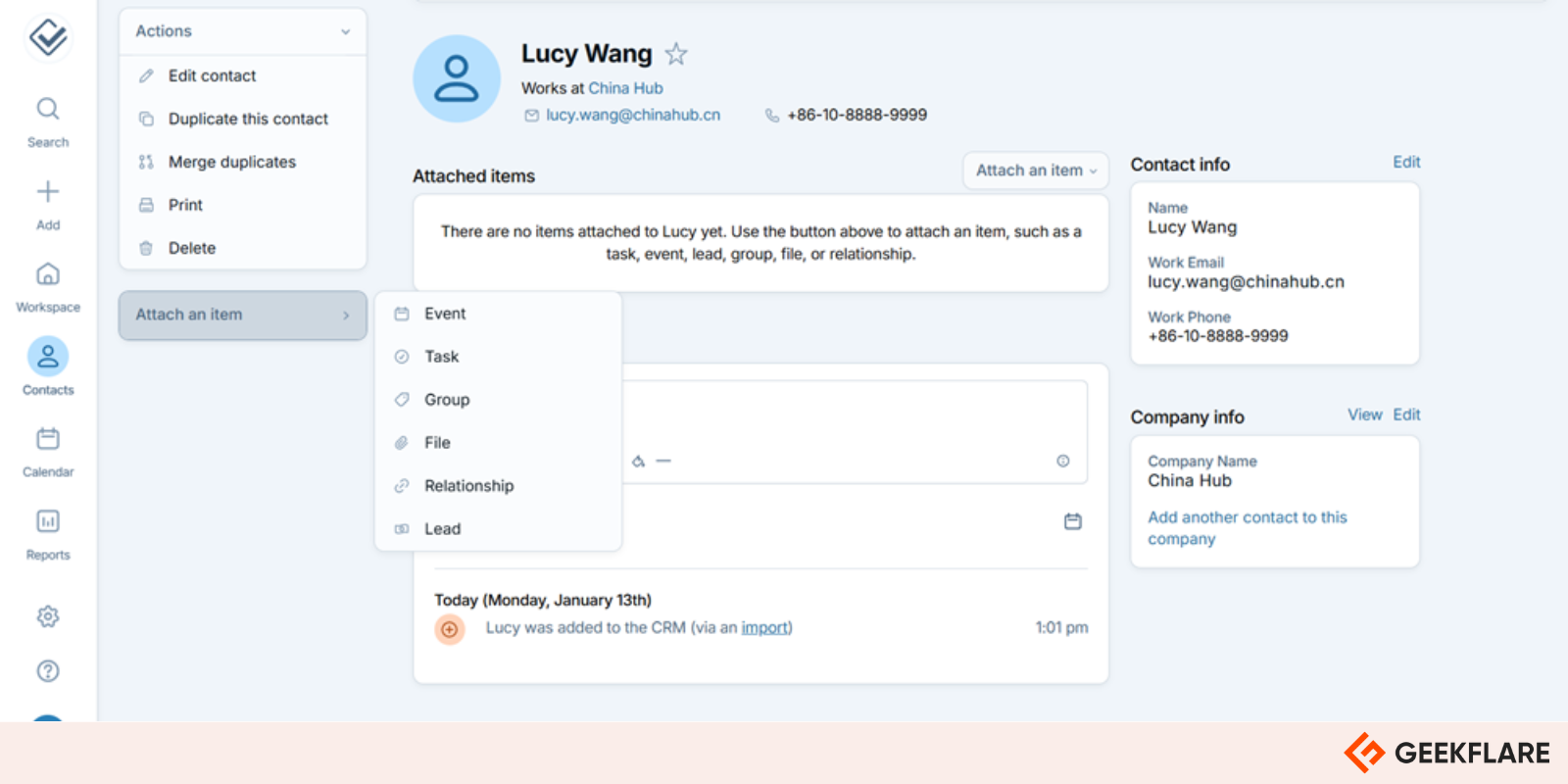
Less Annoying CRM Features
- Centralize, manage, and store all your contacts, data notes, files, tasks, events, and pipeline information in one place
- Set up custom pipelines to track deals or relationships
- Create and send automated email sequences that are triggered on certain events or pre-defined criteria
- Integration to Zapier, Google Calendar, MailChimp, Forms, and more
Pros
Easy to use and adopt
Exceptional customer support
Allows for full transparency and tracking team conversations
Cons
Lacks extensive integration features compared to other CRMs
Weak reporting and analytics features
Less Annoying CRM Pricing
Less Annoying CRM offers a risk-free 30-day free trial. After that, you can switch to a monthly premium plan at $15/user.
14. Bitrix24
AI Assistance Included
Bitrix24 is an all-in-one SaaS with tools for project management, customer support, internal communications, and even website building.
The beauty of Bitrix24 is that all of these otherwise individual tools are packaged in one platform, seamlessly integrated, and available to you via web, desktop, or mobile app.
Manage tasks from a Kanban, Scrum, or Calendar style view. Use customizable triggers to automatically move leads/deals down the sales pipeline, view conversion rates, and bar chart analytics, such as deal and lead lifespan averages.
Ask AI to create compelling marketing text, brainstorm ideas, autofill fields, predict sales, and use cases. In contrast to many of the other CRMs on our list, Bitrix24 has attractive pricing for small businesses, but be ready for a steep learning curve. The user interface can be quite complex and tricky for beginners. Importing new data is more challenging compared to other CRM tools, and adding data manually feels inefficient.
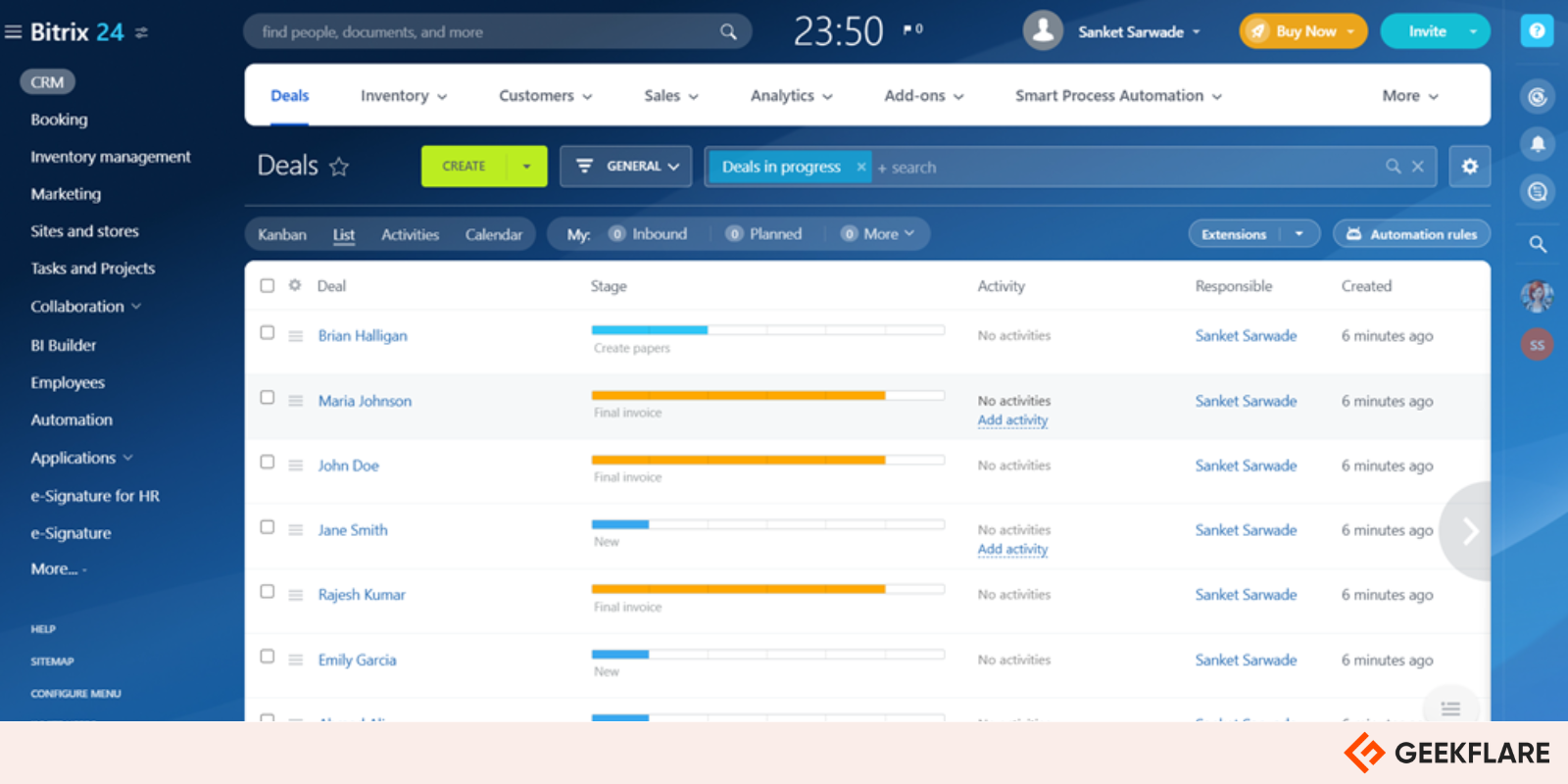
The deal management interface in Bitrix24 CRM lets users can track ongoing deals, including their stages (e.g., “Create papers,” “Final invoice”) and associated activities. The left sidebar offers access to features like inventory management, collaboration tools, and automation rules, making it a comprehensive solution for managing sales and customer relationships.
Bitrix24 CRM Features
- Omnichannel communication via forms, live chat, WhatsApp, Instagram, Email, and more channels
- Create invoices and receive payments from customers
- Use time tracking, Gantt charts, and Kanban boards for effective pipeline management
- Integrated help desk allows for email ticketing, live chat support, and phone assistance
- Has over 100+ ready-made templates to create websites and landing pages for lead-capturing
Pros
Playful user environment, good with reminders and lead tracking
Ready-made templates for forms, websites, and landing pages
Omnichannel coverage, WhatsApp, Instagram, Telephony, you name it!
Cons
Steep learning curve for first-timers
Might fail to handle complex operations and workflows
Bitrix24 Pricing
Bitrix24 CRM offers free forever for unlimited users with limited features. For paid plans, the pricing is listed below:
- Basic: $49/month (5 users)
- Standard: $99/month (50 users)
- Professional: $199/month (100 users)
15. NetSuite CRM
Best for Enterprise
NetSuite offers an enterprise-grade CRM software. The key difference I see with NetSuite CRM is it lets you manage Customers, Vendors, Partners, and Employees– from one place.
The CRM software is integrated with Sales Force Automation (SFA) features such as upsell and quote management to order management, fulfillment, and commissions.
NetSuite’s Upsell Manager automatically determines which items are a good upsell opportunity and which customers are likely to purchase. Based on that, you can deploy multi-channel marketing campaigns using ready-made templates.
NetSuite has a really cool feature called Sticky Notes. You can attach notes to customer profiles or documents and allow replies. Lay down notes by tagging specific recipients to ensure that only specific people have access to your notes.
NetSuite CRM Features
- Manage all interactions with a customer, vendor, or business partner in a single place
- Create targeted marketing based on demographics, purchase trends, response patterns, and support histories
- Automatically manage sales quotas; process commissions and referral bonuses from within the app
- Automatically deploy campaigns across all customer touchpoints to move leads through your sales process
Pros
Efficient partner management via easy payments and commission calculations
Multiple visualization options for sales comparisons (bar charts and graphs)
Easily segment reports for each sales rep with relevant metrics
A scalable solution that grows with your business
Cons
Users found the UI very outdated compared to other attractive CRMs like Keap and Salesmate
Implementing NetSuite CRM is complex and time-consuming
Users have reported dissatisfaction with NetSuite’s customer support
No free trial or pricing info
NetSuite CRM Pricing
NetSuite offers custom pricing, and you need to contact their sales team to get the exact pricing for your business.
16. Bonsai CRM
Best CRM for Small Business
Bonsai’s client relationship management software is ideal for freelancers, agencies, and consultancies. It streamlines client management with built-in project tracking, invoicing, and contract handling.
You can create unique client profiles with all contact details, notes, quotes, rates, and tags. A centralized dashboard lets you view and manage everything from one place. Use Bonsai’s custom tagging to create a custom lead scoring methodology and organize your prospects based on how likely they will turn into customers.
I found an extensive template library with 100+ templates for proposals, quotes, invoices, contracts, and service agreements.

The dashboard of Bonsai CRM shows a list of clients with details such as names, contact emails, and tags indicating their status as “Client” or “Lead.” The left-hand menu offers access to features like proposals, contracts, scheduling, and a client portal, making it an all-in-one platform for managing customer relationships and business processes.
The CRM software is well-integrated with other functions such as time tracking, task management, finance management, and more. Regardless of your plan, you get a bit of all the features coupled.
Bonsai, however, falls short when it comes to advanced data analytics or complex CRM features. I also find the templates and reports a bit rigid, with limited options for customization.
Bonsai CRM Features
- Ready-made, customizable templates for proposals, quotes, invoices, and more
- Automate client intake through customizable forms
- Use simple task lists to organize administrative tasks
- Set up triggers for various tasks, such as sending follow-up emails after a contract is signed or scheduling meetings based on form submissions
Pros
Customizable templates for quotes, invoices, etc.
List view for tracking leads and where they are in the sales funnel
Subcontractor onboarding and management features (Business plan only)
Cons
Limited client management features
Lacks advanced reporting tools
Bonsai CRM Pricing
Bonsai offers a free 7-day trial. Post that, you can continue with any of the below paid plans.
- Basic: $9/user/month
- Essential: $19/user/month
- Premium: $29/user/month
- Elite: $49/user/month
17. Keap
Best for E-commerce Businesses
Keap markets itself as a small business CRM and automation solution. It combines CRM, marketing automation, and e-commerce functionalities. With an average open rate of 20%, Keap’s email tools significantly outperform industry standards.
The drag-and-drop interface allows you to set up sales automation or trigger follow-up emails or notifications when a lead takes a specific action. The platform offers customizable pre-built automation and workflow templates, saving —up to 10 hours per week—by eliminating manual tasks.
My two cents—I found it simple, easy-to-use, and designed with usability in mind. However, I found no free plan, plus a one-off plan at $249 per month for two users with a limit of 1500 contacts. I can’t say if it fits your small business bill.
Keap Features
- Use Keap AI and pre-built Proven Automation Templates to automate sales processes
- Capture contact information in forms and landing pages
- Drag and drop cards to manage new leads as they move through the funnel
- Over 5,000 integrations, Zapier, Gmail, Wordpress, QuickBooks, and more
- Access real-time analytical and financial reports to correlate marketing and sales efforts
Pros
Comprehensive marketing automation tools (e.g., advanced email segmentation and ‘if > then’ automation)
A/B testing for communications
Built-in invoice and payment management
Cons
No free version
Unscalable and costly; you pay more as contacts increase
Keap Pricing
Keap’s plan starts at $249/month for 2 users and 1500 contacts. The price escalates based on the number of users and contacts.
18. Salesmate
Best for Campaign Automation
Salesmate has an excellent contact management system that lets you auto-enrich customer details using Clearbit integration. And then auto-assign contacts/leads to your sales reps using predefined workflows.
Salesmate was awarded the easiest setup and America’s high performer CRM in 2024 by G2. I second that. With a visual sales pipeline, it’s easy to filter, sort, and drag-drop deals from one stage to another or quickly plan the next actions from the board.
Customizability is another delight. You can build custom sales and business pipelines with different stages. Create custom views and reports to monitor and analyze them. Enable role-based access control to ensure people see what they need to see.

The interface allows users to log calls, schedule meetings, and track communication history, providing a complete view of activities and engagement to optimize follow-ups and conversions. I liked the ‘integrated inbox’ in Salesmate with 2-way email sync. It lets me access my emails right from the CRM.
Salesmate Features
- Integrate your favorite apps, including Zapier, Slack, QuickBooks, Gmail, Clearbit, Zoom, and more
- Provide your sales rep with complete information about the contact, past conversions, and related deals on the screen as a call starts
- Measure and analyze calls made by your team and outcomes
- Tag and connect with teammates over conversations, notes, calls, or deals
Pros
Get virtual phone numbers of 80+ countries
Drag-and-drop campaign and content creation for text, dividers, links, etc.
View your campaign success based on any metrics like open rates, etc.
Cons
AI feature is currently invite-only and in beta mode
Some add-ons aren’t available on the basic plan
Salesmate Pricing
Salesmate offers a 15-day free trial for you to explore its features. It offers 24/5 chat and email support with all its plans. The paid plans are highlighted below.
- Basic: $23/user per month
- Pro: $39/user per month
- Business: $63/user per month
- Enterprise: Custom pricing
19. Engagebay
Best for Contacts Management
Engagebay is an all-in-one CRM offering multiple modules for relationship management, sales automation, and help desk management.
It’s easy to bring all customer data together and monitor trends via an intuitive dashboard, including email interactions, website visits, and past communications.
The platform provides tools to manage deals and sales pipelines visually. Users can track the status of each deal, automate follow-ups, and set reminders for tasks related to leads.
Besides, it has an entire marketing automation module with tools for creating landing pages, forms, emails, and social media campaigns.

I like how it combines marketing, sales, and customer service tools in one platform, which is great for small businesses. The marketing automation module saves time and makes managing tasks like email campaigns and contact management easier.
On the downside, it can slow down when handling large data or contact lists. Some advanced features take time to learn, and I’ve noticed missing columns during data imports.
Engagebay Features
- Organize all your email contacts, track deals, and the sales pipeline to grow your sales
- Advanced service automation platform for world-class customer support
- Live chat software for quick, personalized responses
- Customer tracking, deep insights, and unlimited website widgets
- Make calls directly from the platform using an integrated dialing tool
Pros
Share videos in one-to-one emails and broadcasting
SMS marketing tools, such as the ability to send out multiple texts at once
Built-in helpdesk to minimize inefficiencies within the team
Cons
Free plan offers limited contacts
Advanced features like A/B testing and analytics are behind the paywall
Engagebay Pricing
Engagebay offers a free plan with 250 contacts. The paid plans are listed below.
- Basic: $12.74/user/month
- Growth: $55.24/user/month
- Pro: $101.99/user/month
20. Nutshell
Easy to Use Interface
Nutshell is an easy-to-use, flexible CRM that helps your sales team organize their contacts, leads, and conversations in order to grow. Many CRMs trigger boycotts among teams due to complex learning. But not with Nutshell. It has quick onboarding plus a super user-friendly and intuitive interface.
You can view all your customer data using different views, use templates to build sales pipelines, automate lead assignments and email sequences, and more. I recommended it for small to medium-sized sales teams that don’t want tiring get-to-know sessions.

That said, there are a few downsides. The lack of customization options stands out, and creating leads sometimes feels repetitive due to all the data entry. Importing data can also be time-consuming, and I occasionally notice some columns missing during the process.
Nutshell Features
- Use AI to automate your workflows, create a summary of your People, Company, Lead timelines, and other metrics
- Create and automate personalized campaigns and track success right in your CRM
- Centralize your customer data and manage your pipelines
- Communicate with your customers and collaborate with your team
- Create custom pipelines and manage them easily with multiple views
Pros
Robust analytics and reporting tools
Built-in web form builder
Automatically record sales calls with transcripts
Cons
API support is only available with Enterprise plans
Mobile apps don’t function as well as the desktop version
Nutshell Pricing
Nutshell offers a 14-day free trial, extendable with four premium plans.
- Foundation: $13/user/month
- Growth: $25/user/month
- Pro: $42/user/month
- Business: $59/user/month
- Enterprise: $79/user/month
Why Do Businesses Need CRM Software?
Customer Relationship Management (CRM) software allows companies to nurture leads and build relationships. Businesses need to use such platforms to keep lead generation organized. Teams can view the sales funnel status for every prospect and discover potential lifetime value and company revenue.
Using a CRM tool also helps your business build up its sales pipelines more effectively, which can mitigate potential revenue losses caused by churn and ensure that money always has a chance of coming in. 94%[1] of businesses in tech, including 74% of small businesses, use CRM software.
As CRM software becomes key to modern business success, the market is buoyant at a compound annual growth rate (CAGR) of 13.9% from 2024 to 2030, as forecasted by Grand View Research.
What is the Average Pricing for CRM Software?
The average price for CRM software ranges from $9.99 per user per month to upwards of $25 per user per month.
Several factors can influence pricing, such as how many people your subscription has and any add-ons you wish to purchase. Average prices also depend on whether teams buy a monthly or annual subscription, as month-to-month plans typically cost more.
Is there any free CRM for small business?
Yes, Zoho CRM, HubSpot, Agile CRM, EngageBay, Capsule, Bitrix24, Flowlu are Free CRM software suitable for startups and small businesses.
💡Quick CRM pricing summary
✅ Most of the CRM I’ve listed in this article offer free trial or have a free plan.
✅ Salesforce, Monday.com, Pipedrive, Freshsales, Oracle, Keap, HubSpot offer enterprise-ready customizable solution.
What are the Advantages of CRM Software?
Below are the advantages of CRM software.
- Quick and accurate insights: Businesses can gain a better understanding of how their lead strategy is working and the types of people more likely to say yes to their offers. As they add more data, teams will also see which of their products and services are the most valuable.
- Saves time: Teams can use CRM software to automate marketing campaigns and materials, such as email blasts and copywriting. As prospects move further down the sales funnel, users can also automate task statuses.
- Communication: Many CRM tools offer integrations with Gmail and Outlook. Some also have in-app messaging features, and you can also store leads’ contact details. Solutions like Clay relation management software take this a step further by enabling advanced relationship mapping, allowing teams to track connections and interactions more effectively.
- Easier to upsell: Because you’ve already customer and lead contact details in one place (along with lots of information about them), upselling based on their individual needs is more effective and less time-consuming. So teams can reach their revenue targets and improve customer retention.
- Efficient customer support: Teams can see all of a contact’s previous interactions with the company, making it easier to provide dedicated help. Because you can also access all of that individual’s information in one place, resolving disputes with personalized advice is often more straightforward.
What are the Disadvantages of CRM Software?
Below are the disadvantages of CRM software.
- Learning curve: CRM tools can feel overwhelming to beginners, and changing suppliers will also result in teething problems. Sales and marketing teams should expect an initial learning curve when buying new software and consider getting training.
- Upfront investment: CRM software has the potential for significant returns on investment, but paying thousands of dollars per year might be too much if you’re a new business. In these situations, it’s best to find flat pricing structures or use free plans until you can afford something more substantial.
Frequently Asked Questions (FAQs)
Yes, CRM platforms are useful for businesses that sell products and services and are looking to increase their sales conversions and revenue. These tools offer the in-depth analytics required to make intelligent decisions and identify customer trends and behaviors.
Businesse with a limited client base – like freelancers, can manage with a spreadsheet, rather than use a CRM tool. Some other businesses like B2B manufacturers who depend on large ticket transactions and whose sales are handled through long term contracts do not need CRM tools.
Most enterprise software do not come with CRM applications. Enterprise software helps teams keep data in one place and avoid confusion when looking for essential information. However, you sometimes have the option to integrate CRMs (monday.com and Zoho are two examples).
CRM software works by taking inputs about leads, sales, and customers before bringing everything together. You can manually add these bits of information or extract them automatically using automation tools.
Once you’ve added the necessary information into a CRM, you can view reports, contact prospects, and view your chances of winning projects.
CRM is not normally considered expensive to companies with bigger budgets, and the return on investment for making better sales decisions is often higher than the initial upfront cost. Smaller companies can also use affordable or even free plans until they can afford something more complex.
Yes – you can use Excel or Google Sheets as a CRM tool. Excel lets you add tables and update processes as you go along. However, using Excel as a CRM requires much more manual work than custom-made CRM solutions.
Yes, you can use CRM apps to invoice. Some have invoicing features and payment service provider (PSP) integrations, such as Bonsai. However, it’s worth double-checking before you commit to a service; invoicing features aren’t universal to CRM platforms. You may also want to check out the best invoicing software and discover tools specifically designed to meet those needs.
References
View Details
What’s next?
-
 EditorUsha, the editor-in-chief of Geekflare, is a tech-savvy and experienced marketer with a Master’s degree in Computer Applications. She has over a decade of experience in the tech industry, starting as a software engineer and then moving into digital marketing and team management.
EditorUsha, the editor-in-chief of Geekflare, is a tech-savvy and experienced marketer with a Master’s degree in Computer Applications. She has over a decade of experience in the tech industry, starting as a software engineer and then moving into digital marketing and team management.



